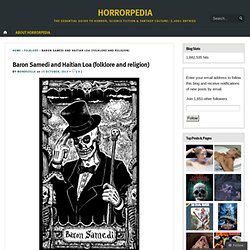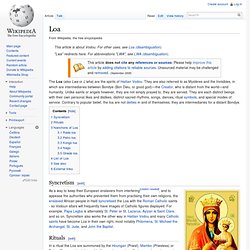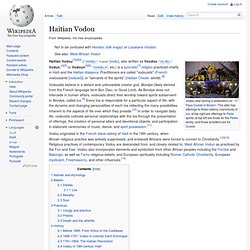

Baron Samedi and Haitian Loa (folklore and religion) « HORRORPEDIA. Baron Samedi (the slightly less impressive Baron Saturday in English, also Baron Samdi, Bawon Samedi, or Bawon Sanmdi) is one of the Loa of Haitian vodou, the spirits of the dead.

Samedi is a Loa of the dead, along with Baron’s numerous other incarnations Baron Cimetière, Baron La Croix, and Baron Kriminel. He is the head of the Guédé (or Ghede) family of Loa, or an aspect of them, or possibly their spiritual father. His wife is the Loa Maman Brigitte. Haitian Vodou, also written as Voodoo is a syncretic religion practiced chiefly in Haiti and the Haitian diaspora. Practitioners are called “vodouists” or “servants of the spirits”. Vodouists believe in a distant and unknowable creator god, Bondye (Bon Dieu, literally ‘Good God’). Vodou originated in the French slave colony of Saint-Domingue in the 18th century, when African religious practice was actively suppressed, and enslaved Africans were forced to convert to Christianity.
Daz Lawrence, Horrorpedia Like this: Like Loading... Loa. The Loa (also Lwa or L'wha) are the spirits of Haitian Vodou.

They are also referred to as Mystères and the Invisibles, in which are intermediaries between Bondye (Bon Dieu, or good god)—the Creator, who is distant from the world—and humanity. Unlike saints or angels however, they are not simply prayed to, they are served. They are each distinct beings with their own personal likes and dislikes, distinct sacred rhythms, songs, dances, ritual symbols, and special modes of service. Contrary to popular belief, the loa are not deities in and of themselves; they are intermediaries for a distant Bondye. Syncretism[edit] As a way to keep their European enslavers from interfering[citation needed], and to appease the authorities who prevented them from practising their own religions, the enslaved African people in Haiti syncretised the Loa with the Roman Catholic saints - so Vodoun altars will frequently have images of Catholic figures displayed.
Rituals[edit] Nanchons of Loa[edit] Rada loa[edit] Haitian Vodou. Vodou altar during a celebration for Papa Guédé in Boston.

This altar has offerings to three nations (nanchons) of loa: at top right are offerings to Rada spirits; at top left are those for the Petwo family; and those at bottom are for Guédé. Haitian Vodou[3] (/ˈvoʊduː/, French: [vodu], also written as Voodoo /ˈvuːduː/; Vodun,[4] or Vodoun[4] /ˈvoʊduːn/, etc.) is a syncretic religion practiced chiefly in Haiti and the Haitian diaspora. Practitioners are called "vodouists" (French: vodouisants [voduisɑ̃]) or "servants of the spirits" (Haitian Creole: sèvitè). Vodouists believe in a distant and unknowable creator god, Bondye (likely derived from the French language term Bon Dieu, or Good Lord). As Bondye does not intercede in human affairs, vodouists direct their worship toward spirits subservient to Bondye, called loa. Names and etymology[edit] Vodou is a Haitian Creole word that formerly referred to only a small subset of Haitian rituals. Beliefs[edit] Deities[edit]